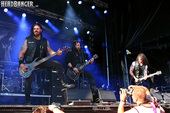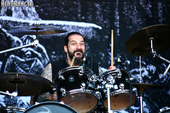Rotting Christ
I Want To Consider Our Music Soulful
25.12.2018
Архив интервью | Русская версияOne of the main reasons why I wanted to do this interview so bad was one of my friends’ remark: Rotting Christ interviews aren’t very interesting, she said, too many generic responses. And I thought to myself — well, maybe no one asks Sakis right questions? As crazy as it sounds, the one who we usually call “a Greek god” is always willing to have an informal friendly discussion. And that’s exactly what makes interviewing him so challenging: conversations with Sakis aren’t something to be orchestrated and a list of the most sophisticated questions won’t help you unless you are as sincere and interested in establishing a connection as Sakis is. To an extent, I’m guilty of making this very mistake. Knowing him for a die-hard romantic, I’ve never expected to learn that bonding with fans is part of his philosophical/artistic vision. But that’s exactly what he always does: he evokes ancient spirits to better communicate with us, metalheads, and to spread heresy over the earth. Anyway, I’ve learnt my lesson and have already come up with an excuse to talk with Sakis once again. Rotting Christ are coming back to Russia next year, after all.
All your fans in Russia — myself included — are super excited about the upcoming album. And even more so after the album title, tracklist and artwork were revealed. As far as I’m concerned, “The Heretics” is dedicated to some great heretics of the past like Voltaire and Edgar Allan Poe…..
(with great enthusiasm) YES! But they weren’t considered heretics back in the day. They were considered very sinful people and stuff like that, but you know, sometimes the society needs people that boost things in order to make the next step. So yeah, this album was definitely inspired by some great heretics from the history of our time.
Are there any other heretics present on the album or is it more about that abstract idea of heresy?
I kinda call myself a heretic, I recently wrote a book about myself…..oh, about the band, sorry. And I realized looking at my past that I had quite a heretic life, life that doesn’t follow the normal path. Some of that is more or less similar to the lives of those great heretics of the past we’ve mentioned before. I think all the metalheads, people who are involved with this kind of music or the great majority of them — they are all heretics but they don’t know that. We make some step-ups in this life, we make something different, we push things a little bit. And I’ve realized — yes, I’m quite a heretic kind of person. So, why not write something about this?
Who is the greatest heretic of our times in your opinion? Is there such a person?
Hmm, hard to say….
Maybe it’s you?
(chuckles) No, no, no, I’m not. But I think metal, the black metal scene is the most heretic thing. Even if we face problems now, some people in the future will maybe realize and will open more…
They aren’t seen as heretics now, though. More like prophets….
Erm…let’s say prophets… not exactly prophets but kind of, you’re right.
Why have you decided to go with this particular title then, with “The Heretics”?
Because before I start writing an album, or a particular song, I talk with myself: do I have anything to say to people? Will I be honest? Then I grab my guitar and compose something. And this particular time I realized I have something more to say to people. First of all, I realized I’m a heretic, the music we play is quite heretic. We aren’t that kind of band, I’m not that kind of person who writes music just to write. I don’t write music like the rest of the bands to just go on tour or to keep on selling the back catalogue. We were quite romantic people when we started back in the 80s with different visions of our life, with different aroma that I try to keep even nowadays. And I realized that we’re quite heretic people, we’re strange people. So I grabbed a guitar and came up with this album.
If I’m not mistaken, one of your ambitions for Rotting Christ is to use as many languages as possible. In a recent interview you said you’re fond of Spanish and German. I don’t recall you ever singing in either of them and yet there is another song in Russian. Why is that?
Hah! Because I like Slavic people, Slavic metalheads have supported our band a lot and I feel a part of them. I’ve toured so much there during the last few years and that’s why I thought: why not include something in Russian, something Slavic? So I wrote one song which is quite pagan, I’d say. The song calls to the powers of nature, to all pagan religions that Christians have fought so much throughout the years in order to establish their power against all pagan religions. So, I think the Russian language’s feeling is more pagan and more Slavic in general that’s why I wrote the song in Russian.
Are all the lyrics in Russian or is it… (“just like with ‘Rusalka’”, I was going to add but Sakis was ready with a response before I even finished the question)
No, no, just the chorus. I couldn’t make the whole song in Russian.
Yeah, it would be too challenging…
Yeah, I guess. (with a gentle chuckle)
Speaking of languages. I remember you saying that different languages have different energies. And I myself really believe in the Sapir–Whorf hypothesis (the hypothesis of linguistic relativity – ed.). But how can one properly feel these different energies, how can one recognize the individuality and uniqueness of each and every language without actually speaking them?
We feel the power, we feel the vibes. We are forced to speak English, we are not English, we cannot express ourselves as we want. But metal is a wide phenomenon. Everywhere I’ve played, people have the same way of thinking, the same dress code and things like that. So sometimes when we’re forced to speak a language which isn’t our native, we miss things. I try to encourage people that metal should be played by all the nations from around the world in their own language. Sometimes you just feel the power, every language has something different — the way it’s spoken, the way it sounds, the way people express with a bad language and all this fascinates me because I’ve been travelling since I remember myself and that’s why I’ve chosen this direction.
Another curious thing that I remember you saying many times is that you can’t create when you’re happy…
No, no, no, I can’t!
…and it is misery that serves as the driving force. What is it that makes you unhappy, or sad, or miserable and thus helps you to write music?
Oh no, I cannot say miserable. Unhappy, rather. I’m unhappy since I remember myself. Even if I try to escape with my friends and have fun sometimes, deep inside I’m not happy. Do you know why? Because I realize that life is not like I want it to be: I don’t see unity in the world, I don’t see equality. There are so many differences and they make me a little bit unhappy. On the other hand, I’m very lucky that I have, let’s say, the talent, the power to write music, to express myself through it and thus survive. I often want to escape from this world. Some people escape with drugs, some people escape with alcohol, others escape with other things they call bad habits. I escape with my music. And I’m very satisfied, I’m very glad because I can survive.
I think music is the only truly religious experience we have these days…
In my opinion, yes. Of course, I have to take care of everyday things just like anybody else does but at the same time I feel that we’ve lost our soul, feelings, we grew apart. I’m not young anymore, I’m 47 which means that I’ve lived to see the last human analogue generation, I remember the best from this period of time and I feel like, ‘right, let’s pass some of these elements to the future, to the present’. Despite the fact that we also follow the socials, we also follow the stream nowadays, we try to pass some things from our past to the new generation, things that have more to do with the soul. And this is why I want to consider — I don’t know if it’s good music or a bad music, if you like it or not — I want to consider my music, our music soulful. This is very important, and I think I achieved this.
Speaking of the past. I’m curious as to what extent Ancient Greek culture is recognized in modern Greece. If you approach a random individual and ask them about Euripides, for example, will it ring a bell?
Oh, they don’t give a shit about such things any more. All the people in Greece now — not only in Greece, everywhere around the world — only care about money, they care about being famous, they care about having an easy life without putting much effort in it. And these things don’t go well with my personality. Of course, there are people who are influenced by the Ancient Greek civilization but nowadays globalization has destroyed everything. People have only one religion — money. And this is what they try to unite people with around the world. I don’t know if it’s good or bad for the human history, the future will show. But sometimes it’s hard to see the difference in people all around the world.
So, do you have a bleak vision of our future?..
No, I want to stay positive. I think there are people out there, maybe we don’t see them, maybe they aren’t involved with social media and stuff and they have a different way of living, different “orama” (Greek word for “worldview” – ed.), a different vision. And I want to believe that those people will be able to change the world a little bit…
Are there any young bands that are capable of doing it?
I cannot name any right now because there are too many bands which keep the spirit alive. If I mention some, I’m sure that I’ll forget some others. I think there is a new healthy underground wave that can bring some changes — not revolution, I cannot call it a revolution. I don’t think that life can change, that the world can change because of metal but at least we are here, we are people, we are heretics, we are people who have chosen a different path and it’s very important for me because it gives me power to move on. I don’t want to create music to just be part of a system. I’ve never wanted it. I want to believe that even if we follow the system, I want to believe that the system can change from within. This is the way we’ve chosen as a band.
It’s not the only source of inspiration for you. You also read a lot. I’ve heard about it in your interviews many times.
Before I write an album? Because that’s what I meant. I don’t have enough time nowadays to read a lot because I’m too busy, because of all the touring and stuff but when I start to write something, of course I read and I have some kind of self-meditation and when I realize I have something to say to people, I go ahead with another album.
What is the most influential book you have ever read?
Hmm, hard to say. It’s like choosing just one band. Let’s say, Homer’s “Odyssey” which isn’t that influential nowadays but this is the first book we learn at school which means that… you know, the first will always be deep inside you. So, I’m quite influenced by the ancient Greek “Odyssey”.
What book should every Rotting Christ fan read and why? Apart from your own “Non Serviam”, of course.
Hmmm, I don’t know, I’m not that kind of person to suggest things. I think at this period of time I’d suggest books of all those heretics that I’ve mentioned on the album. I can mention Nietzsche, I can mention Thomas Paine, I can mention Dostoevsky, I can mention many of them. I can also mention Nikos Kazantzakis, a Greek heretic. I just think that if people look at and really search some works by….yeah, prophets — let’s call them prophets, maybe you’re right in calling them prophets — you can have a very good education about yourself. You can see things and truths that were written, the truths that exist out there.
And all the reading I do, all the meditations — they make you hear songs in your head, don’t them?
Yes, yes, this is how it works. I don’t know any music notes!
So, you hear music in your head. But how about hearing others? I mean I have always been curious as to what extend Vagelis (Karzis, bass) and George (Emmanuel, guitar) are involved in the creative process?
I come up with an idea, I pre-product at home and I give it to the guys so that they make it more professional. I also sometimes need help, because without help you are nothing. So I come up with an idea, I pre-product at home, I write roughly the whole song, and then I spin it to the other guys, to Themis (Tolis, drums), Vagelis and George.
What I find even more interesting, is that both Vagelis and George have their side-projects and both bands have recently released new albums. Which means they were writing music for two completely different bands at the same time. Does the music Vagelis and George play with their bands influence Rotting Christ in any way?
No, because they have time to do that. I write all the music and lyrics and I leave other guys total freedom to do what they want, so it doesn’t influence Rotting Christ. I am the only person who has been writing music in Rotting Christ since the band was born. They help me with all the technical parts, recording albums in George’s studio because it’s very important to record with a friend. I kinda realize that they can help me but in a different way — they don’t influence me. Their side-projects are different things, I don’t want to get involved.
By the way, you have a side-project too…
Oh yes, Thou Art Lord.
And the last album was released 5 years ago….
Yeah, I don’t have enough time to do it anymore, that’s the problem.
Does this mean there won’t be new songs?
(in a rather sad voice) No new songs, no time for this, Lena, that’s the problem. We are currently living in very busy times and I don’t like this. Sometimes I really regret…. Why do I work so much? Why am I doing so much? There is this vanity in this life. Why are you doing this, why are you doing this? I’ve lost time to see our friends, our close people, to write some music. And sometimes I’m just wondering — does it make sense or no?
I guess one of the reasons is that it’s extremely hard to make a living by playing music…
Exactly, exactly! It’s extremely hard and that’s why the band is touring a lot. If we get money, we invest in the band, of course, and then we pay our bills, that’s all. So, I’m very happy that I can make my living by playing music but it’s very hard because you have to sacrifice a lot of things and the price is very big sometimes.
And what are the most brutal sacrifices that you have made?
I cannot see my kids, it’s a very big thing.
In “Non Serviam” you write about those many challenges you had to face and overcome in the beginning of your musical career. From what I’ve heard, those were rather rough times. And I was wondering — is it just as difficult nowadays for a Greek musician to be recognized, and accepted and to basically be able to make a living playing their music?
Of course it’s hard. Not only in Greece — all around the world. Well, actually, in Greece it’s not that hard because, you know, the financial crisis made the prices very low, so, comparing to Scandinavian bands, we can make our living with less money. On the other hand, it’s very hard because you have to sacrifice a lot of things and…. I don’t know many people who’d want to do that. People prefer to have an easy life. Since I remember myself, I’ve never chosen this way. I chose writing riffs, playing guitars over an the opportunity to have a proper job and something like that. And I’m still doing the same nowadays. I can stay here, see my kids, see my own people but I don’t do that because I have that feeling of a warrior. And when I say ‘warrior’, I don’t know what I’m fighting for but I’ve got to believe that what I’m doing is an expression of freedom, that influence that can maybe help those people out there. Freedom is not something that you have, you have to fight for your freedom. And when I say freedom — you have to fight with your demons, you have to fight with yourself. Do you know how hard it is? Very hard. It’s very hard to be yourself.
Let’s lighten the atmosphere a little bit (or sour it). I can’t stop thinking about your biography and one of the reasons is that it features interviews with Themis and he never does that kind of thing! Why does he never give interviews?!
(chuckles) He doesn’t want to, as simple as that. He’s that kind of person who doesn’t want to get involved with interviews, and photos and stuff like that. There is an explanation, this is him. So I take all the hard work on behalf of the band.
In “Non Serviam” we can also find interviews with lots of the bands Rotting Christ have worked with one way or another. Has any of the musicians interviewed said anything surprising, or unexpected?
No. You know, when you’re involved with people and corporate partners for so many years, you definitely receive some unexpected things. But you know, it didn’t get to be written, I think.
And what about Watain? They are also featured in your book and the European tour you’ve just finished wasn’t the first time you’ve toured together. Are you really that close?
Yes. Watain is the truest black metal band nowadays. And this is said by someone who’s very strict about this. We really like to do things with these guys even if it’s a hell of a tour. When there is fire every night, you feel it — like the old days. And I want to say that touring with Watain we feel like the old spirit is alive. This is very important for us.
What really fascinates me about Rotting Christ is that your every performance is truly unique as if you somehow adjust to every audience you play to and to every venue. Do Watain influence your stage performance in any way?
I can’t really say ‘influence’ but they definitely help us a lot to keep the spirit alive, that help us a lot to be close to our roots. You know, sometimes, when you have some recognition from the media, from papers, from fans, you lose touch with reality. And Watain help us not to do that.
It’s interesting that you mentioned the connection with the reality. Isn’t it escapistic in a way to do all these things onstage, like corpse paint, fire, blood?..
No, no, I’m not that kind of person, we are different. We never use corpse paint, we always let our music speak. But on the other hand, I enjoy bands which use corpse paint, it’s up to them. We are different people, we have a different mentality, we grew up in a different situation under different circumstances back in time. Don’t forget that we grew up in the 80s. Things were totally different back then. On the other hand, we are very open-minded people and accept everything. So, even if there’s fire and if a band uses corpse paint, the most important thing for me is always music. And I think Watain are doing good music. I want to believe that we let our music speak and this is more honest — a more honest approach to our fans for us.
Is that why you’ve now stopped using your stage name Necromayhem which you used in Thou Art Lord and on early Rotting Christ albums?
Yes, exactly. I can easily wear corpse paint to pretend I’m evil but sometimes I’m not as evil, as I want to pretend. And sometimes when you do things that are not you, you feel it. It’s not good to not be fair with the fans. If my music speaks to your soul, for me it’s the most valuable thing because I think that music was created for music and not for the image.
Another question that I can’t help but ask. Your new album is all about rebellion and heresy and yet you agree to censor yourself when you come to some countries. Just like in Russia last year, you had to perform as Rotting C.
He-he, yeah, we were forced to do that. Otherwise our show wouldn’t have happened. In Georgia we went to jail for one day (Sakis said this in such an everyday way as if it’s no big deal – ed.). Things happen like this but you know, on the other hand, when you’re in a different country, there are some authorities that force you to do that. We don’t want to but they force us. For example, in Russia we couldn’t play under our real name but we had to play in Russia because we love our Russian fans, they have supported us from day one and I should be there. And when I play and I know that we are Rotting Christ and we fight for freedom of speech. And we are working on a Russian tour for next September.
Rotting Christ on the Internet: https://www.rotting-christ.com/en
Special thanks to Jessica Otten (Season Of Mist Records) for arranging this interview
Interview by Lena Pashko
Photos by Natalia “Snakeheart” Patrashova, Margarita Stefankova
December 4, 2018
© HeadBanger.ru







